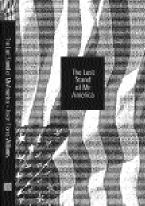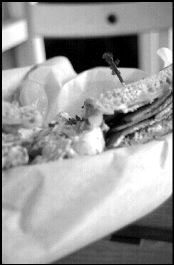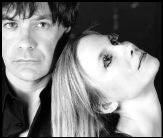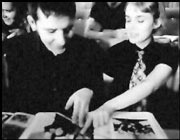THE LAST STAND OF MR. AMERICA
by Jason Flores-Williams (Canongate Books, $14) Elliott Bay Book Co., 101 S. Main, 624-6600 7:30 p.m. Sat., Feb. 16
I slap her in the face, hard. The trannies outside the door squeal in delight. I am Satan. These are my little demons. The world is supporting my evil. I have no regrets. I am pure. I want to fuck God in the mouth. I want to rape the Virgin Mary. I want to see the niggers lynched. I want to ship Jews to concentration camps. I want the genitals of little children to line my walls. There is nothing in the universe that can quench my self-hatred. It is the only way I can love the world.
WHILE IT’S NEVER entirely fair to print a single paragraph of a book without providing context, the above is actually fairly representative of Seattle’s new literary bad boy Jason Flores-Williams’ The Last Stand of Mr. America. The book is a minefield of bold, sweeping statements, plenty of which are unapologetically vile, misogynistic, nihilistic, racist, and angry. You’re supposed to be shocked, but Flores-Williams’ dare is built upon his unwavering confidence (OK, arrogance) that what he’s saying, and how he’s saying it, is so wholly original that you have no choice but to take him seriously.
Flores-Williams’ vehicle in Last Stand is Sam, a tortured creature who divides his time among his soul-crushing job as a PR specialist, a raunchy subterranean sex club, and a towering home entertainment system. No matter the place, Sam is numb—either by drink or by circumstance. His feelings of powerlessness, even when manifest as sexual impotence, are never presented with humor. Flores-Williams refuses to wink; he has no interest in satire. Last Stand is intended as a wake-up call for the American male, a species supposedly endangered by an increasingly complex (and feminine) world, one that forces Sam to cling to the precious few remaining bastions of manhood: whiskey, football, and blow jobs.
Because so much more space is devoted to the symptoms of Sam’s disease than its origins, an acceptance of the premise that American manhood is in a state of crisis is almost a prerequisite. The book’s over-caricatured office segments (corporate culture doesn’t require so much embellishment to appear stifling) go nowhere in explaining his sickness, and his ugly behavior at the sex den doesn’t arouse any pity. While Flores-Williams may not care if Sam is unlikable, the absence of any sympathy for his plight has to be considered a serious weakness in the book.
Though the root of his issues may remain mysterious to many, it’s not especially hard to figure out Sam’s attraction to whiskey, football, and blow jobs (I’ll confess to being generally in favor of all three)—they’re simple pleasures and Sam clearly believes that the modern world is severely lacking in these. His essential complaint is that life’s relationships and rituals are just too darn complicated to navigate; he’s left with no other choice but to explore the black-and-white of life’s extremes.
Depending on your outlook, this narrow view is either Last Stand‘s great strength or ultimate failing. It at least allows Flores-Williams to operate in a subtlety-free zone where he can make large gestures, something at which he’s perfectly adept. As easy as it is to reject the meanness of the book and its alleged crisis, it’s much harder to deny some of its author’s skills. Flores-Williams understands cadence and rhythm better than most writers, and his language is usually crisp and vivid; whether you like it or not, he’ll make you see (and often smell and taste) the filth, blood, and various other bodily fluids that stain his world.
Unfortunately, Flores-Williams’ biggest gestures in Last Stand—Sam’s two attempts for redemption—don’t entirely work. One involves a sexual encounter with a beautiful transvestite (you do see the irony that this ber-hetero only finds fulfillment from having anal sex with a man, right?) and the other a justifiable act of violent rage. By the time Flores-Williams gets to these events, though, he’s already had our pants at our ankles so long and bashed us in the head so many times that the impact is far less than what’s intended. The two scenes do, however, capture the essence of The Last Stand of Mr. America—they’re sure to disgust and likely to ring hollow, yet their brutality and their author are hard to forget. And that just may be all Flores-Williams is hoping for.








